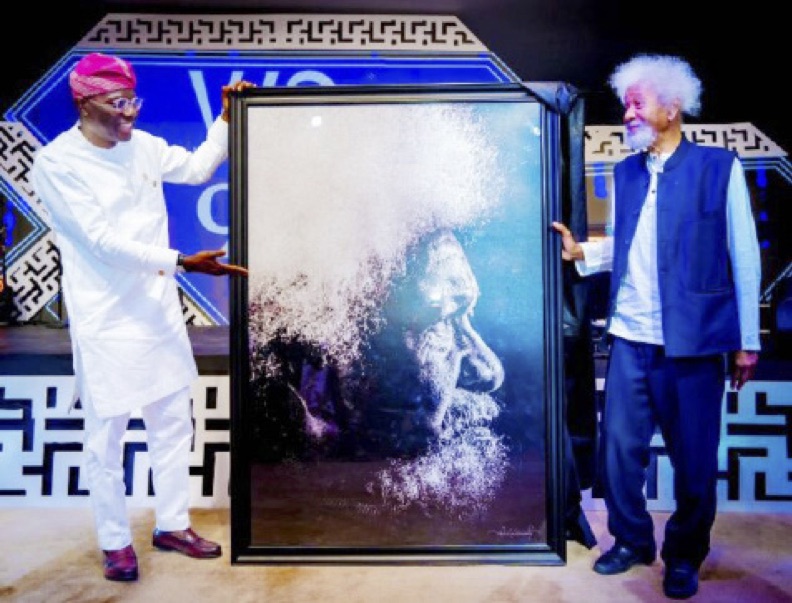By Damiete Braide
On July 13, the seventh edition of the “Timeless Memories: Elastic Effects of Wole Soyinka” exhibition opened at Kongi’s Harvest Gallery, Freedom Park, Lagos. This year, the exhibition is particularly significant as it marks the 90th birthday of Nigeria’s literary giant and Africa’s first Nobel laureate in literature, Professor Wole Soyinka.
Curated by archivist and historian Oludamola Adebowale, the exhibition is a tribute to Soyinka’s enduring legacy and his indomitable spirit in the face of tyranny. The exhibition is entitled “The Man Who Didn’t Die in the Face of Tyranny”, inspired by Soyinka’s prison notes, The Man Died, published in 1971.
It features an immersive experience with special audio and video installations where Soyinka himself narrates his harrowing experiences during his 22 months of solitary confinement between 1967 and 1969. This period of incarceration was one of the most challenging times in Soyinka’s life, as he was imprisoned for his opposition to the Nigerian Civil War and his calls for peace and dialogue.
The installations provide a powerful insight into the resilience and fortitude of a man who stood unwavering in his convictions, despite facing grave danger and adversity. The venue has become a space where visitors can engage with Soyinka’s legacy and reflect on the broader themes of freedom, justice, and human rights.
Oludamola Adebowale, the curator, explained that the exhibition series aims to explore the fundamental nature of humanity and the resilience of individuals like Soyinka who stand firm in the face of oppression.
“The exhibition series speaks to the core of one of those situations that tested the resilience of the icon and also the fundamentals of humanity in everyone. How do you measure the true test of a man when he stands in the face of tyranny?” Adebowale stated.
In addition to the exhibition, a special lecture was held at the MUSON Centre, Onikan, Lagos, to honour Soyinka’s 90th birthday. The event, part of the 16th Wole Soyinka Centre Media Lecture, was themed “The Death of Truth? Realism, Literature and Journalism” in an age of disinformation.
The lecture brought together literature icons, journalists, media experts, and policy advocates to discuss the importance of truth, critical thinking, and media literacy in today’s digital age, where disinformation is rampant.
The panelists included esteemed figures such as Biodun Jeyifo, a professor of African and African American Studies at Harvard University; Kadaria Ahmed, CEO of RadioNow; Odia Ofeimun, a renowned poet, author, and political scientist; and Chiamaka Okafor, co-founder of the Media and Information Literacy and Intercultural Dialogue (MILID) Foundation. The session was moderated by Tolulope Adeleru-Balogun.
The panelists emphasised that the absence of critical thinking, introspection, verification, and media literacy has led to an increase in disinformation in the digital age. They highlighted the importance of realism in literature and journalism as a means to depict the world honestly and accurately. The discussions underscored the need for individuals to engage in introspection and verification to protect the values of truth, justice, peace, fairness, and social equity.
Biodun Jeyifo, the keynote speaker, explored the theme of justice as the first condition of humanity. He argued that truth is not dead but is under siege by forces of disinformation and falsehood.
Odia Ofeimun, another panelist, echoed these sentiments, stating that the only thing that could survive the confrontation between truth and falsehood is the truth itself. He noted that society must not wait for the collapse of truth but instead actively engage in its preservation.
Chiamaka Okafor highlighted that disinformation often fills the void left by a scarcity of truth. She noted that the dissemination of falsehood is sometimes incentivised, creating a “paid truth.”
Kadaria Ahmed expressed concern that truth is on “life support” due to the effective tools used to disseminate falsehoods. She called for self-examination to ensure that truth is reflected in the world.
The lecture also featured remarks from Ropo Sekoni, a professor of Semiotics and African Literature, who described Soyinka as the “youngest nonagenarian” and praised his contributions to civilisation. The celebration of Wole Soyinka’s 90th birthday serves as a powerful reminder of his enduring legacy and his tireless advocacy for truth and justice.
Through his writings, activism, and unwavering commitment to human rights, Soyinka continues to inspire generations to stand firm in the face of tyranny and to champion the values of freedom and equality.

